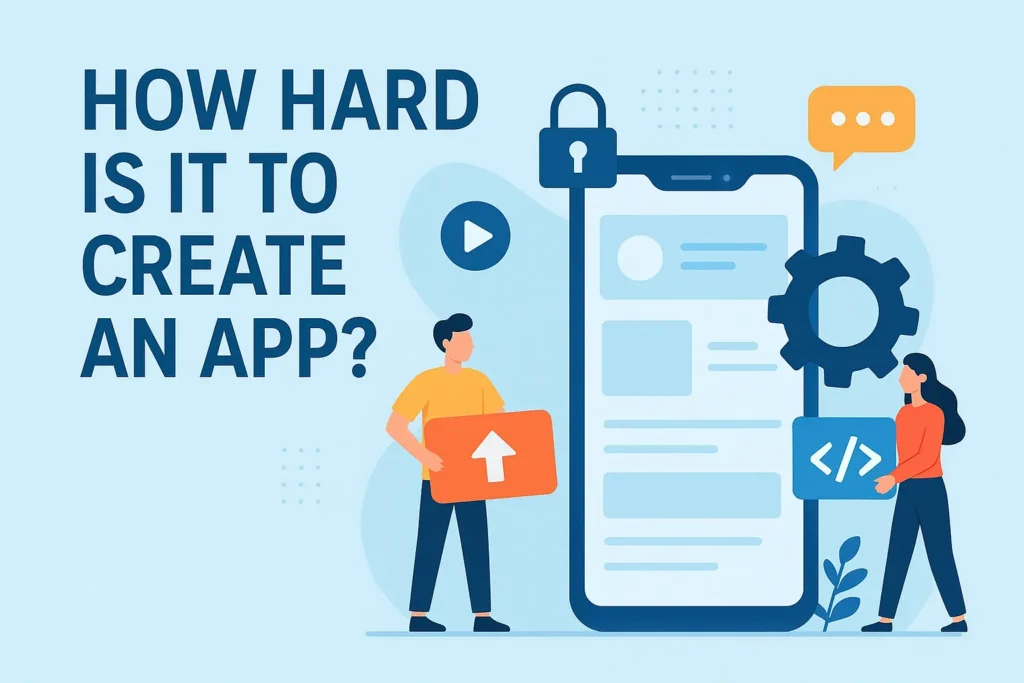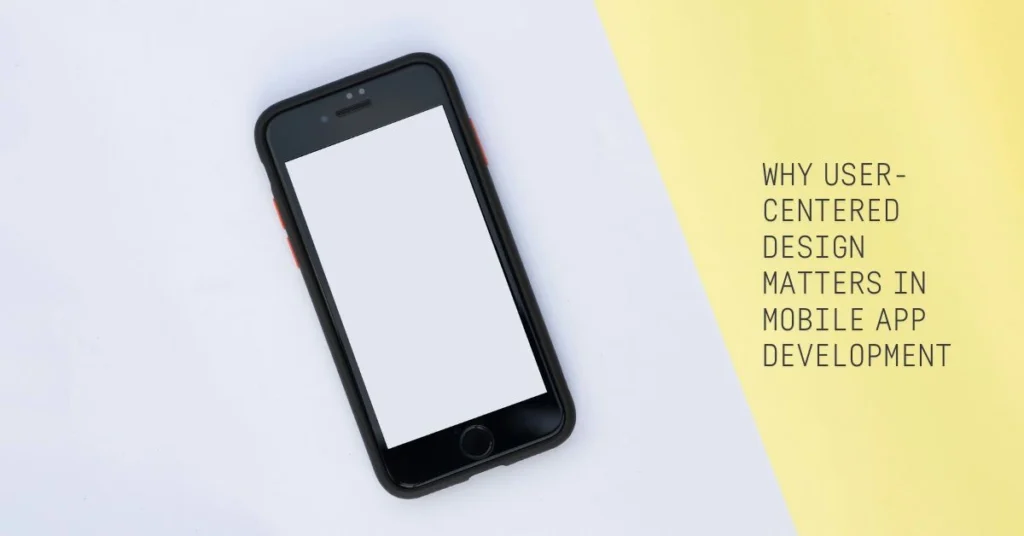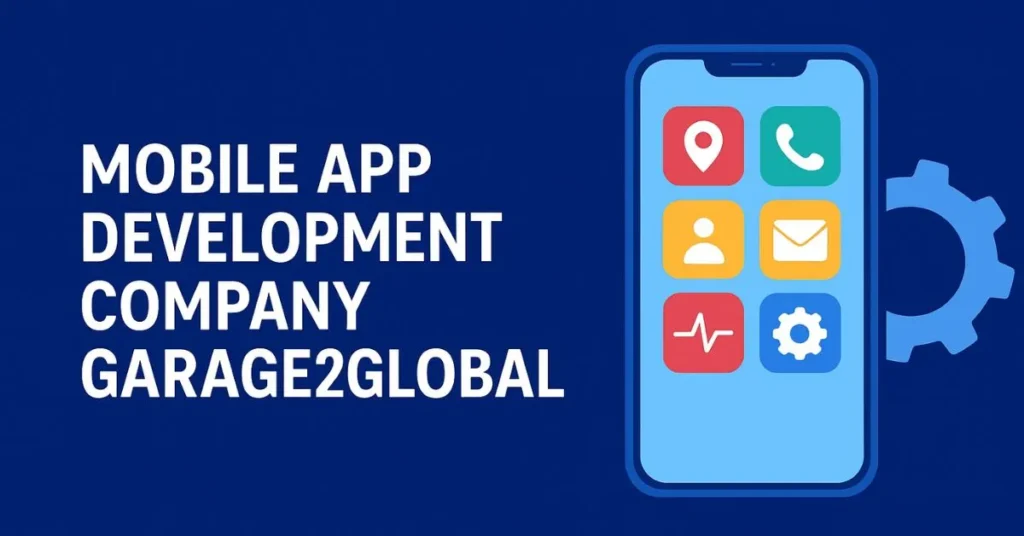In today’s digital-first world, mobile apps power everything from communication to commerce. Whether you’re an entrepreneur with a game-changing idea or a student curious about app development, one big question arises: how hard is it to create an app?
The short answer: it depends on your goals, budget, and technical skills. But the good news is—building an app is more accessible than ever before. With the right strategy, tools, and mindset, anyone can transform an idea into a fully functional app.
According to Statista, the global mobile app market is projected to reach over $756 billion in revenue by 2027. Consequently, this surge explains why entrepreneurs and creators are eager to learn how hard it is to create an app.
This comprehensive guide combines the best strategies from leading industry platforms and goes even deeper, offering practical insights, step-by-step instructions, and expert recommendations to help you confidently navigate the app creation journey. Explore our Mobile App Development category for expert insights.
Understanding How Hard It Is to Create an App
Creating an app isn’t just about writing code. In fact, it involves a clear vision, a well-structured process, and smart execution. Whether you build your app through code or no-code platforms, the difficulty level can range from beginner-friendly to highly technical, depending on your approach.
Three core factors influence how hard it is to create an app:
- Complexity of the idea – A simple calculator is easier to build than a real-time social platform.
- Your skill level – A beginner might use no-code platforms, while experienced developers write custom code.
- Resources and tools – Quality frameworks, UI libraries, and testing platforms can simplify the process dramatically.
Defining Your App Idea and Strategy
Before writing a single line of code, define your concept clearly. Otherwise, many first-time creators struggle with how hard it is to create an app simply because they skip this crucial step. A solid strategy simplifies everything later.
Ask yourself:
- What problem does your app solve?
- Who is your target audience?
- How will your app stand out?
Example: Think of how Uber disrupted transportation—not just by creating an app, but by solving a real-world problem.
Mini Checklist to Define Your App Strategy:
- Clear problem statement
- Target audience identified
- Feature list drafted
- Monetization idea sketched
Pro Tip: Document your features in a simple roadmap. This way, you ensure you stay focused and avoid unnecessary complexities. For a deeper understanding of app ideation and design, check our blog on Why User-Centered Design Matters in Mobile App Development.
Choosing Between No-Code, Low-Code, and Custom Development
When analyzing competitor platforms, one insight stands out: the path you choose directly affects how hard it is to create an app.
1. No-Code Platforms – Easiest Entry Point
Platforms like Adalo and GoodBarber allow users to build apps without writing a single line of code.
Perfect for:
- Beginners
- Small businesses
- Prototyping quickly
Pros:
- Fast development
- Lower cost
- Visual interfaces
Cons:
- Limited customization
- Platform restrictions
2. Low-Code Platforms – Balanced Approach
These offer drag-and-drop functionality with the flexibility to add some custom code. Great for startups aiming for more control.
3. Custom Development – Maximum Control, More Complexity
Using frameworks and languages (like JavaScript, Swift, or Kotlin), you can build fully custom apps.
Perfect for:
- Complex apps
- High-performance needs
- Full control over design and functionality
Insight: Competitor articles highlight the ease of no-code tools. However, going beyond that—explaining the when and why of each approach—makes this guide more actionable and strategic. For professional custom app development, explore our services at Mobile App Development Company Garage2Global.
Step-by-Step: How Hard Is It to Create an App in Practice?
Breaking the app creation process into clear steps removes a lot of the uncertainty. Here’s a practical roadmap:
Step 1: Research and Plan
Study your audience, competitors, and market. Successful apps start with solid research and a validated idea.
Step 2: Design the User Experience
Create wireframes and mockups that visualize how your app works. Tools like Figma can simplify this step. Learn more about user-focused design in our UI/UX Design category.
Step 3: Build the Core Features
Whether using no-code tools or custom development, focus on building the Minimum Viable Product (MVP) first. This helps you launch faster and refine based on real user feedback.
Step 4: Test Rigorously
Test your app on different devices and operating systems. Early testing prevents expensive rework later.
Step 5: Launch and Gather Feedback
App stores make launching easy—but real success comes from iteration. Gather user feedback and continuously improve.
How Long Does It Take to Create an App?
Competitor content often focuses on “how” but misses the realistic timeline discussion.
| App Type | Timeline (Estimated) | Difficulty Level |
|---|---|---|
| No-Code Simple App | 2–6 weeks | Beginner-friendly |
| Medium Complexity App | 2–6 months | Moderate (some coding) |
| Advanced Custom App | 6+ months | High (full development stack) |
Real Example: Instagram started with a small feature set and grew into a global platform through continuous iteration—not overnight.
How Much Does It Cost to Create an App?
Budgeting is one of the most critical considerations.
| Development Type | Estimated Cost | Best For |
|---|---|---|
| DIY / No-Code | $0–$5,000 | Beginners, small projects |
| Freelancers / Small Team | $10,000–$50,000 | Startups, small businesses |
| Custom Enterprise | $100,000+ | Large-scale, complex applications |
Factors affecting cost:
- Features and complexity
- Platforms (iOS, Android, or both)
- Design quality
- Third-party integrations
Pro Tip: Start lean. Build your MVP with essential features, then scale as user feedback grows.
Key Challenges That Make It Hard to Create an App
Even with powerful tools, app creation can have obstacles:
- Lack of a clear vision
- Poor UI/UX design
- Underestimating backend complexity
- Inadequate testing
- Budget overruns
However, with structured planning, these challenges become manageable, not roadblocks.
How to Make App Development Easier
To compete at the highest level, focus not just on building but on building smart. Here are proven strategies to ease the process:
- Use frameworks to reduce development time
- Leverage UI kits for clean, modern design
- Automate testing wherever possible
- Adopt agile methodologies for faster iterations
- Outsource specific tasks if needed, such as design or backend
Expert Insight: A strategic approach often matters more than technical skill alone.
SEO and Marketing: Why Your App Needs a Launch Plan
One overlooked section in many competitor articles is post-launch strategy. Even the best apps fail without visibility.
- Create an SEO-friendly landing page
- Optimize your app store listing with relevant keywords
- Use social media and email campaigns to build early traction
- Encourage user reviews and referrals to boost ranking
Linking internally to your App Development Guides or Startup Strategy category helps users explore related content, while linking externally to authoritative platforms like Forbes or Statista strengthens trust signals.
This marketing layer can turn a functional app into a successful product.
Real-World Stories: How Hard Is It to Create an App for Startups and Creators
Scenario 1: A Fitness App
You start with a clear problem: helping beginners stay consistent.
You choose no-code tools for fast prototyping.
You launch an MVP in 4 weeks, gather feedback, then gradually add premium features.
Scenario 2: A SaaS Founder Building an MVP
A SaaS entrepreneur defines a core B2B solution, uses low-code for backend logic, and integrates a custom front end.
By focusing on solving one critical pain point first, they reduce development costs and time, validating their idea faster.
These scenarios show that app creation doesn’t have to be overwhelming when approached strategically.
Final Thoughts: So, How Hard Is It to Create an App?
The question “how hard is it to create an app” doesn’t have a one-size-fits-all answer. For some, it’s a simple no-code project launched in weeks. For others, it’s a complex, multi-stage journey involving teams, tools, and technology.
But with the right approach, anyone can build an app—even without years of technical experience.
The key lies in:
- Defining a clear idea
- Choosing the right development path
- Testing early and often
- Launching strategically
- Iterating continuously
If you’re ready to bring your idea to life, start small, learn fast, and build confidently. The tools, frameworks, and knowledge are more accessible than ever—so why wait?
Ready to start your app development journey? Explore our Mobile App Development category for expert insights and check out more tips on our blog page to stay ahead in 2025.
FAQs Related to “How Hard is it to Create an App”
How Hard Is It to Build an App Without Coding?
Creating an app without coding is easier than ever with no-code platforms like Adalo and Buildfire. Moreover, these tools let non-technical users design and launch apps visually. However, limitations in customization may occur, and for advanced features, basic coding or developer help may be needed.
What Are the Steps to Build an App?
First, define your goals. Next, research your market. Then, design the UX with wireframes. After that, choose a development approach, build the app, test it, and finally launch while marketing to users. Following these steps ensures smoother development.
How Much Does It Cost to Build an App?
Costs vary by complexity: DIY/no-code apps range from $0–$5,000, freelancers $10,000–$50,000, and custom enterprise apps $100,000+. In addition, app features, platform, and integrations impact the budget.
What Are Common App Development Challenges?
Common challenges include unclear vision, poor UI/UX, backend complexity, inadequate testing, and budget overruns. However, tackling these early can make development more successful.
How Long Does It Take to Develop an App?
Timelines depend on complexity: no-code apps take 2–6 weeks, medium apps 2–6 months, and advanced custom apps 6+ months. Furthermore, planning and prioritizing features can help meet deadlines.


